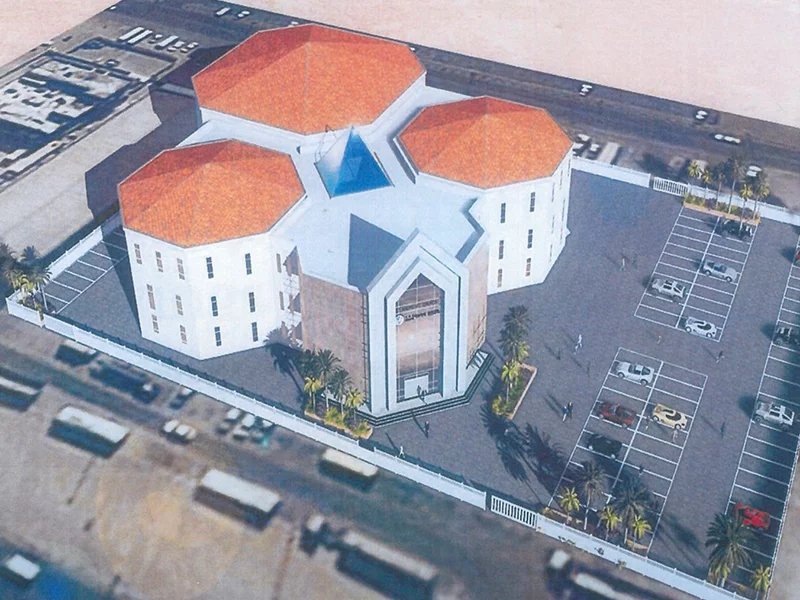In the Middle East this year, Holy Week had a bloody start with the bombings claimed by Islamist extremists at Egyptian Coptic church services that left dozens dead and more than 100 wounded on Palm Sunday.
But Christians are being encouraged to practice their faith in another part of the Islamic world — the United Arab Emirates, where the region’s largest Anglican Church is now being built.
With room to hold up to 4,200 worshippers, All Saints Anglican Church is about two-thirds complete.
The Anglican Church’s senior chaplain in the emirate is the Rev. Andy Thompson, whose ministry in the Middle East goes back more than 20 years. He is a driving force behind the All Saints church project.
“This is very much a work of faith,” Thompson said. But it hasn’t been easy. A key donor pulled out early on, during the first year of construction, when there was a sharp dip in oil prices.
“We were faced with the choice of abandoning the process or not,” Thompson said. But with donations from parishioners and others during the last year and a half, about 60 percent of the estimated 20 million UAE dirhams (5.4 million dollars) needed for the project has been raised and it is expected to be completed by December.
The emirates stands out among Islamic countries in their degree of tolerance of other faiths. The church where Thompson currently serves, St. Andrew’s Anglican Church, is next door to the Crown Prince Mosque in Abu Dhabi’s Al Mushrif area. On the other side of that mosque is St. Joseph’s Catholic Cathedral. And in Dubai, the UAE’s largest city, that emirate’s Grand Mosque is next door to a Hindu temple.
On Fridays, the main day off here, St. Andrews is packed with thousands of worshippers at any given time attending a wide variety of services from sunrise to about 9 p.m.
Every room, building, meeting hall and courtyard is filled with a wide variety of worshippers, from Syrian Orthodox, Mar Thoma, and Indian Pentecostals to Ethiopian Orthodox, several African denominations, Adventists and others.
But St. Andrew’s is in a fairly affluent area, and those who do not have access to a car, bus or taxi fare sometimes find it difficult to get there to worship.
The new church location is in the Musaffah industrial district, near the residential quarters of around 25,000 laborers, typically from India, Pakistan or Bangladesh. Unable to find work in their home countries, the workers come to the UAE to perform manual labor for long hours, often in the desert heat.
Problems with employer treatment of laborers do exist here — it is one of the reasons why the All Saints project is important. But foreign workers are treated better than in Saudi Arabia, Qatar, Kuwait and other nearby countries. They must be provided with health insurance — often the first time these workers have ever been insured. And Emirati employers are required to prevent employees from working outside for the hottest three hours of the day during the summer months.
The UAE’s policy of religious tolerance certainly stands in contrast to nearby countries, such as Saudi Arabia, where the construction of non-Muslim houses of worship is discouraged. Why is this difference so apparent?
“I think the difference is how the ruling families perceive the outside world,” Thompson said. “In Saudi Arabia, the ruling family originated in the middle of Saudi, in the desert. They’ve had very little contact with foreigners during their history.
By contrast, he says, Emiratis have long had maritime contacts through their pearl-diving industry and shipping trade with Iraq, Iran and India.
“The Emiratis have a very pragmatic philosophy,” he said. “In order to engage in trade, they’ve learned to accept people who believe very differently than themselves. They’ve come to a level of maturity where they feel that they don’t have to fight people of different beliefs.”
A half a century ago, the founder of the UAE, Sheikh Zayed bin Sultan Al Nahyan, “welcomed American missionaries who were doctors and nurses,” Thompson said.
“He appreciated that these were people of prayer who used their faith to serve humanity as a way to express their love for God.”
The UAE’s tolerance policy is also an outgrowth of the Maliki fiqh, or school of Islamic jurisprudence, which is predominant in Abu Dhabi and Dubai, as compared to the Hanbali and Wahhabist interpretations found in Saudi Arabia and Qatar. Maliki Islam is more resistant to calls for a re-establishment of the caliphate, and the political movements, both violent and nonviolent, that promote them.
In the spirit of tolerance, the land for All Saints Anglican Church was donated by Abu Dhabi’s royal family, the Al Nahyans. And the church itself shares its facilities with other congregations that have no location of their own.
“The Catholic Church provides hospitality for the Catholics. The Orthodox Church provides hospitality for the Orthodox,” Thompson said. “The evangelicals have a doctrinal statement which, if you fall outside of that statement, they’re really not interested in hosting you.
“The Anglicans host everybody else.”
All Saints Anglican Church will have a center for dialogue with people of other faiths, especially Muslims.
“In some places in the Middle East, and in the West as well, we have seen walls going up and attitudes hardening as people embrace the lies of intolerance,” Thompson said. “Here we see tolerance in action.”

